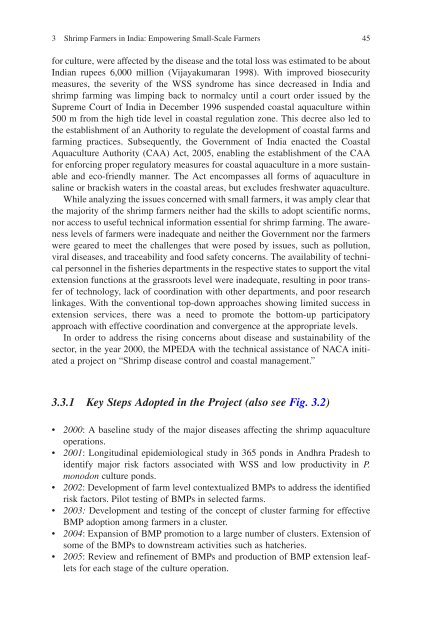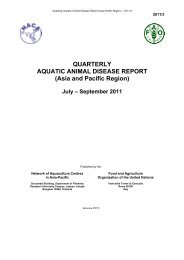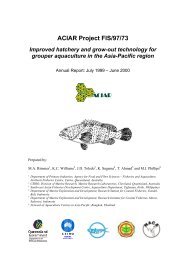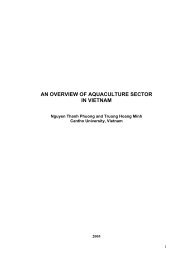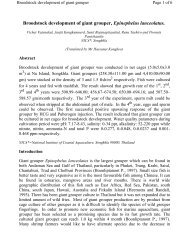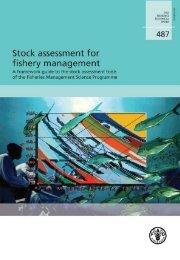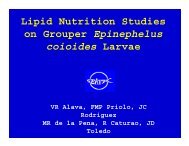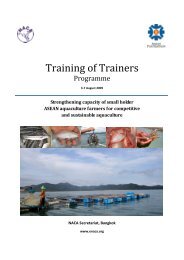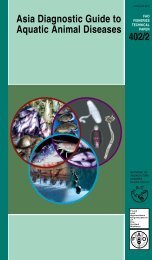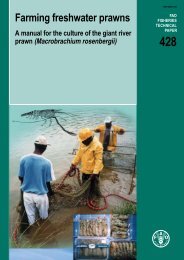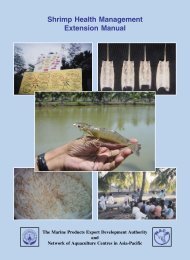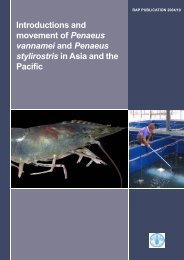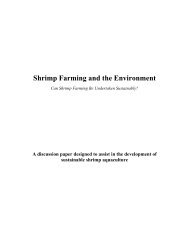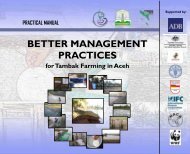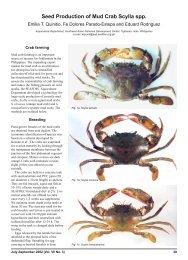Success Stories In Asian Aquaculture - Library - Network of ...
Success Stories In Asian Aquaculture - Library - Network of ...
Success Stories In Asian Aquaculture - Library - Network of ...
- No tags were found...
Create successful ePaper yourself
Turn your PDF publications into a flip-book with our unique Google optimized e-Paper software.
3 Shrimp Farmers in <strong>In</strong>dia: Empowering Small-Scale Farmers45for culture, were affected by the disease and the total loss was estimated to be about<strong>In</strong>dian rupees 6,000 million (Vijayakumaran 1998) . With improved biosecuritymeasures, the severity <strong>of</strong> the WSS syndrome has since decreased in <strong>In</strong>dia andshrimp farming was limping back to normalcy until a court order issued by theSupreme Court <strong>of</strong> <strong>In</strong>dia in December 1996 suspended coastal aquaculture within500 m from the high tide level in coastal regulation zone. This decree also led tothe establishment <strong>of</strong> an Authority to regulate the development <strong>of</strong> coastal farms andfarming practices. Subsequently, the Government <strong>of</strong> <strong>In</strong>dia enacted the Coastal<strong>Aquaculture</strong> Authority (CAA) Act, 2005, enabling the establishment <strong>of</strong> the CAAfor enforcing proper regulatory measures for coastal aquaculture in a more sustainableand eco-friendly manner. The Act encompasses all forms <strong>of</strong> aquaculture insaline or brackish waters in the coastal areas, but excludes freshwater aquaculture.While analyzing the issues concerned with small farmers, it was amply clear thatthe majority <strong>of</strong> the shrimp farmers neither had the skills to adopt scientific norms,nor access to useful technical information essential for shrimp farming. The awarenesslevels <strong>of</strong> farmers were inadequate and neither the Government nor the farmerswere geared to meet the challenges that were posed by issues, such as pollution,viral diseases, and traceability and food safety concerns. The availability <strong>of</strong> technicalpersonnel in the fisheries departments in the respective states to support the vitalextension functions at the grassroots level were inadequate, resulting in poor transfer<strong>of</strong> technology, lack <strong>of</strong> coordination with other departments, and poor researchlinkages. With the conventional top-down approaches showing limited success inextension services, there was a need to promote the bottom-up participatoryapproach with effective coordination and convergence at the appropriate levels.<strong>In</strong> order to address the rising concerns about disease and sustainability <strong>of</strong> thesector, in the year 2000, the MPEDA with the technical assistance <strong>of</strong> NACA initiateda project on “Shrimp disease control and coastal management.”3.3.1 Key Steps Adopted in the Project (also see Fig. 3.2)• 2000 : A baseline study <strong>of</strong> the major diseases affecting the shrimp aquacultureoperations.• 2001 : Longitudinal epidemiological study in 365 ponds in Andhra Pradesh toidentify major risk factors associated with WSS and low productivity in P.monodon culture ponds.• 2002 : Development <strong>of</strong> farm level contextualized BMPs to address the identifiedrisk factors. Pilot testing <strong>of</strong> BMPs in selected farms.• 2003: Development and testing <strong>of</strong> the concept <strong>of</strong> cluster farming for effectiveBMP adoption among farmers in a cluster.• 2004 : Expansion <strong>of</strong> BMP promotion to a large number <strong>of</strong> clusters. Extension <strong>of</strong>some <strong>of</strong> the BMPs to downstream activities such as hatcheries.• 2005 : Review and refinement <strong>of</strong> BMPs and production <strong>of</strong> BMP extension leafletsfor each stage <strong>of</strong> the culture operation.


